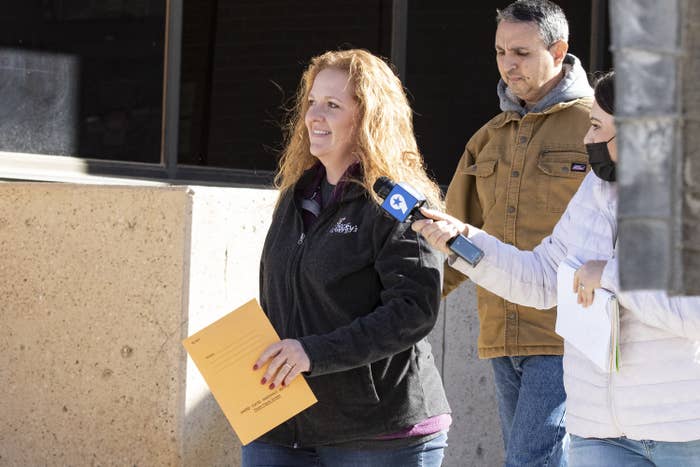
WASHINGTON — The US attorney’s office in Washington, DC, expects to start offering plea deals to people charged in the Capitol insurrection in the next 30 days, a prosecutor told a judge on Friday.
None of the 300-plus people charged with participating in the Jan. 6 riot at the Capitol have pleaded guilty to charges so far. Court filings in recent weeks have confirmed that some defendants are open to cutting a deal, but until now prosecutors had been vague about timing, at least in their public representations about the investigation. They’ve told judges that because of the mountain of evidence they’re still gathering and sifting through, they needed more time before they could make offers.
During a Friday morning hearing in the case of two alleged Capitol rioters, Jenny Cudd and Eliel Rosa, Assistant US Attorney Amanda Fretto said that based on information prosecutors had received from supervisors, it sounded “like things are moving along.” Fretto said she had spoken with lawyers for Cudd and Rosa about agreeing to suspend deadlines in their case for 30 days to give the government time to extend a plea offer.
Cudd’s lawyer Marina Medvin confirmed that timeline, telling US District Judge Trevor McFadden that before the hearing she’d spoken with the government and was “assured” they’d receive an offer within the next two to three weeks. Although Fretto had discussed a 30-day timeline with the defendants, she also said the government would prefer a 60-day extension to give the defense enough time not only to review any plea deal but to make a counteroffer and negotiate. Medvin objected to a longer delay.
McFadden split the difference and suspended deadlines in Cudd and Rosa’s case for another 45 days. The next hearing is set for April 29.
Cudd and Rosa are facing a five-count indictment that charges them with one felony crime, obstruction of an official proceeding, and four misdemeanors for illegally being at the Capitol, disorderly conduct, and other related crimes. The obstruction charge carries a maximum penalty of 20 years in prison, although the sentencing range that any given defendant faces depends on a variety of factors, including whether they agree to cooperate with the government and take a plea deal.
Federal law spells out specific deadlines in criminal cases once a person is arrested, often referred to as speedy trial rights. But the government can ask to suspend those deadlines under certain circumstances, including in especially complex cases. Federal prosecutors this week filed a new round of requests for deadline extensions in a number of Capitol riot cases, including for Cudd and Rosa. The government is arguing that the huge scope of the investigation means they need more time to handle each of the individual cases they’ve brought to date. They also shared that they expected to bring at least 100 more prosecutions; the Justice Department has previously said they had more than 500 active case files, and the US Capitol Police estimates approximately 800 people went inside the Capitol on Jan. 6.
In the latest requests to push back case deadlines, prosecutors disclosed that law enforcement officers had executed more than 900 search warrants nationwide and collected more than 15,000 hours of surveillance and police body camera footage, approximately 1,600 electronic devices, and more than 210,000 tips from the public. Investigators had also produced more than 80,000 reports with 93,000 attachments based on witness interviews and other steps they’d taken as part of the investigation.
Medvin on Friday pushed back against the government’s efforts at seeking delays in individual cases based on the collective complexity of the Capitol investigation. She said the government hadn’t charged all of the hundreds of defendants together as part of a big conspiracy — a small number of cases involve conspiracy charges — and that meant each defendant was entitled to have their speedy trial rights enforced.
“They chose to arrest, they chose to indict, and here we are. The government chose this time frame,” she said.
McFadden said he didn’t think that Cudd and Rosa’s case was complex on its own, but also understood that it was “unusual” given the broader context of the whole investigation into Jan. 6.
Cudd — whose request to travel to Mexico for a work bonding trip after her arrest generated significant press attention and public outrage — is one of the few defendants who have proactively begun to fight their prosecution. Earlier this week, her lawyer filed a motion to transfer the case from Washington to Texas, where she lives, arguing that the jury pool in DC was tainted by “detrimental pretrial publicity and community prejudice.”
Cudd was charged jointly with Rosa and also filed a request this week to sever her case from his. The two went into the Capitol together on Jan. 6, according to charging papers, but Cudd’s lawyer has argued that charging them together created the “appearance” of conspiracy even though they aren’t charged with that offense. Cudd is also arguing that the joint prosecution hurts her ability to defend herself, since, for instance, she wouldn’t be able to call Rosa as a defense witness at trial if he’s also a defendant in that trial.

